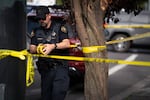
Portland police cordon off a neighborhood after an officer shot and killed Alexander Tadros, 30, while assisting the Drug Enforcement Agency on Aug. 27, 2021 in Portland, Oregon.
Jonathan Levinson / OPB
The Portland Police Bureau extended a pattern this week of not naming officers who used their weapons on the job, citing ongoing and unspecified threats to those officers as the reason for the departure from the standard policy.
While the bureau hasn’t provided any details or evidence of the threats, they announced on Wednesday that the FBI would investigate the potential danger to police officers.
The sudden sharp turn toward less transparency first occurred July 29, when a police bureau press release announced the agency would not release the name of a Focused Intervention Team officer who shot and killed someone two days prior.
“PPB has determined that there are credible security threats to officers involved in recent shootings and therefore, PPB is withholding the name of the involved member during the pendency of the doxing investigation,” the release said.
The release said the officer’s name might be made public after the investigation. Police bureau officials declined requests for additional information at the time. Police also never publicly identified the person killed in that shooting, also a departure from standard procedure in past police shootings. The Oregonian/OregonLive later reported the person killed was Aaron Stanton, 40.
After another Focused Intervention Team officer shot someone on Monday, the bureau said the FBI is investigating threats to officers, and that officer names will continue to be withheld until the investigation is complete, at which point “the security threat will be reassessed.” Portland said one sergeant and two officers were involved in Monday’s shooting during a standoff with Robert Connelly, 49. Connelly, who police say pointed a gun at officers, was not injured.
Portland Police Bureau directives require the names of officers involved in using deadly force and in-custody deaths to be made public within 24 hours “absent a credible security threat.” The police bureau declined an interview request and did not explain who made the decision to withhold the officers’ names or how they interpret the directive.
Dan Handelman of the police watchdog group Portland Copwatch said the bureau is claiming a broad, ongoing security threat when the directive only applies to the officer involved in the specific incident.
“They can’t claim an ongoing security threat based on officers not involved in the incident,” Handelman said.
A spokesperson with the FBI office in Portland said Friday that the agency could not confirm or deny the existence of an investigation into the alleged threats, which is in keeping with FBI policy.
Speaking to KATU on July 29, Special Agent in Charge Kieran Ramsey, who heads the Portland field office, said the FBI was aware of threats to Portland officers.
“It’s not right, it’s just simply not right to see these officers’ names are being released and then immediately they’re being doxed, they’re being harassed at a level that continues this concern of overall community safety,” Ramsey told the television station.
The about-face in releasing officer names comes as Portland police continue to rack up deadly force incidents. So far they have shot at six people this year, killing three. The Focused Intervention Team, one of Portland’s latest efforts to reduce elevated levels of gun violence, has been involved in three of those shootings. In one incident on May 6, four officers on the 12-man team were involved in a shooting during a traffic stop. According to police, Matthey Leahey, 36, exchanged gunfire with the officers and sustained life-threatening injuries. Leahey survived and faces an attempted first-degree murder charge, among other allegations.
After an investigation into the May 6 shooting, Multnomah County District Attorney Mike Schmidt found the shooting justified and declined to indict the officers.
The Portland Police Bureau has tried to hide the names of officers before because of unspecified threats against them. During the 2020 racial justice protests, the bureau allowed officers to use numbers on their uniforms instead of name tags. A judge smacked that policy down and eventually forced the bureau to release the names of officers and their corresponding numbers.
Threats being leveled toward law enforcement are part of a growing national trend that has placed several professions in the crosshairs of an increasingly extreme populace turning toward violence or threats of violence to address grievances. Doxxing and threats of violence directed at teachers, librarians, election officials and journalists have become more common in recent years, and in several instances led to physical attacks.